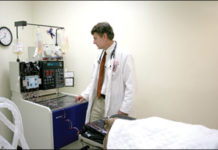Older Dogs and Surgery
Some are reluctant to perform surgery on old dogs because of anesthesia risks or complications, but these risks are minimal in the case of most lipomas. Modern anesthesia protocols are far safer than they used to be, and complications are generally minor, usually limited to superficial infection or delayed healing. There is no reason not to remove lipomas from older dogs when they interfere with their quality of life.
It’s OK to Get a Second Opinion Before Putting Your Dog Through Surgery
Your dog is limping and you don’t know why, so you take him to your veterinarian. The vet pushes, pulls, and palpates and announces that your dog probably has torn ligaments in his knee. She says that he needs surgery, and she can take care of that. While you love your dog’s vet, you’re just not sure that you agree, and you’re also unsure whether surgery is the route you want to take. You feel uncomfortable thinking the thought, but wonder what another veterinarian might recommend.
12 Tips to Avoiding Trips to the Emergency Vet
Every year, thousands of dogs are treated in emergency veterinary hospitals across the country. I know; I spent nearly a decade as an emergency-room veterinarian. I always found it interesting that many of the most common injuries and illnesses I saw in emergency practice were also some of the easiest to prevent! Many of these problems can be avoided with a little common sense and preventative medicine.
Bone Marrow Transplants Offer a Promising Treatment for Canine Lymphoma
Exciting news regarding bone marrow transplants for dogs with lymphoma has recently emerged. North Carolina State University’s College of Veterinary Medicine in Raleigh is the first university in the world to open a canine clinical bone marrow transplant (BMT) unit. Dr. Steven Suter, assistant professor of veterinary oncology at NCSU, is about to perform his 30th transplant, all done over the past two years. Lymphoma, also called lymphosarcoma, is one of the most common cancers to occur in dogs. While it used to be considered a disease of middle-aged and older dogs, those demographics have changed in the past 5 to 10 years, with more and more young dogs being diagnosed. Golden Retrievers have a particularly high risk for this type of cancer.
How to Prepare for An Emergency Animal Hospital Visit
If you have a dog, emergencies are inevitable. Dogs are prone to injuries, ingestion of toxic substances, and illnesses. Are you prepared in an emergency? Do you know what to do and what not to do? After nine years as an emergency veterinarian, I've seen it all! Here are my top tips for helping your emergency-room veterinarian help your dog.
Regaining What Was Almost Lost
first discovered Petey at their local humane society shelter in 1990. Scheduled for euthanasia the next day
Should You Race to Take Your Dog to the Emergency Vet Clinic?
the odds are good that your dog's symptoms will resolve with time.
True Veterinary Emergencies
Dogs can be real stoics, and it can be hard to tell if they are in pain or feeling poorly. Your best bet is to pay close attention to your dog when she is healthy note subtle things, like how she holds her body, the quality of her coat, the vibrancy in her eyes so you can notice when she's not feeling her best.
Post-Surgical Procedure Protective Collars or “Coneheads”
The lampshade, satellite dish, or cone no matter what you call it, it is hard not to alternately laugh and feel sorry for any dog wearing one. Often used after surgical procedures, these cone-shaped collars are designed to keep dogs from licking sutures or wounds, potentially opening the wounds or tearing the stitches. They are also used to keep a dog with an injury or surgical site on his head from scratching it with his paws.
Give Your Dog a Smooth Recovery
Dogs are lousy patients. It's as simple as that. True, they don't constantly call for a glass of water or a plump of their pillow, but that's precisely the problem: Often unable to communicate distress, and possessing a stoicism that masks their true level of discomfort, dogs can mislead their owners into thinking that all's well after a surgical procedure, when in fact it's anything but.
Don’t Villify Surgery
We received the following long – but very informative – letter from Evelyn Orenbuch, DVM, the vice president of the American Association of Rehabilitation Veterinarians. It helps further our readers’ education about their options for treating canine CCL injuries.
Xylitol Poisoning
Xylitol poisoning can cause hypoglycemia in 10 to 15 minutes. If you think your dog has ingested xylitol contact ASPCA poison control at (888) 426-4435 immediately.

















